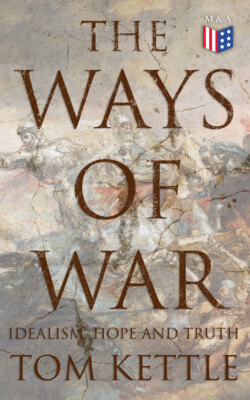Читать книгу The Ways of War: Idealism, Hope and Truth - Tom Kettle - Страница 3
На сайте Литреса книга снята с продажи.
PREFATORY NOTE
ОглавлениеTable of Contents
Perhaps the order of the chapters in the present book requires a word of explanation. They have a natural sequence as the confessions of an Irish man of letters as to why he felt called upon to offer up his life in the war for the freedom of the world. Kettle was one of the most brilliant figures both in the Young Ireland and Young Europe of his time. The opening chapters reveal him as a Nationalist concerned about the liberty not only of Ireland—though he never for a moment forgot that—but of every nation, small and great. He hoped to make these chapters part of a separate book, expounding the Irish attitude to the war; but unfortunately, as one must think, the War Office would not permit an Irish Officer to put his name to a work of the kind. After the chapters describing the inevitable sympathy of an Irishman with Serbia and Belgium—little nations attacked by two Imperial bullies—comes an account of the tragic scenes Kettle himself witnessed in Belgium, where he served as a war-correspondent in the early days of the war. “Silhouettes from the Front,” which follow, describe what he saw and felt later on, when, having taken a commission in the Dublin Fusiliers, he accompanied his regiment to France in time to take part in the Battle of the Somme. Then some chapters containing hints of that passion for France which was one of the great passions of his life. One of these, entitled “The New France,” was written before the war had made the world realise that France is still the triumphant flag-bearer of European civilisation. Then, in “The Gospel of the Devil,” we have an examination of the armed philosophies that have laid so much of France and the rest of Europe desolate. The book closes with “Trade or Honour?”—an appeal to the Allies to preserve high and disinterested motives in ending the war as in beginning it, and to turn a deaf ear to those political hucksters to whom gain means more than freedom. Thus “The Ways of War” is a book, not only of patriotism, but of international idealism. Above all, it is a passionate human document—the “apologia pro vita sua” of a soldier who died for freedom.
L.
Many of the chapters in this book have already appeared in various newspapers and magazines, to the editors and proprietors of which thanks are due for permission to reprint them here. The sources of the chapters referred to are as follows—
| “Under the Heel of the Hun” | } | Daily News. |
| “Zur Erinnerung” | ||
| “The Way to the Trenches” | ||
| “G.H.Q.” | ||
| “Belgium in Time of Peace“: Freeman’s Journal. | ||
| “The New France”: Irish Ecclesiastical Record. | ||
| “The Soldier-Priests of France“: The Hibernian Journal. | ||
| “The Gospel of the Devil”: T. P.’s War Journal. |
